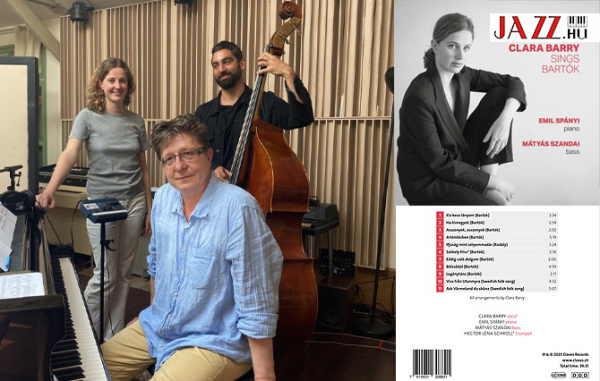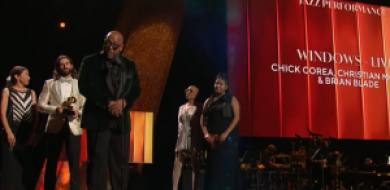
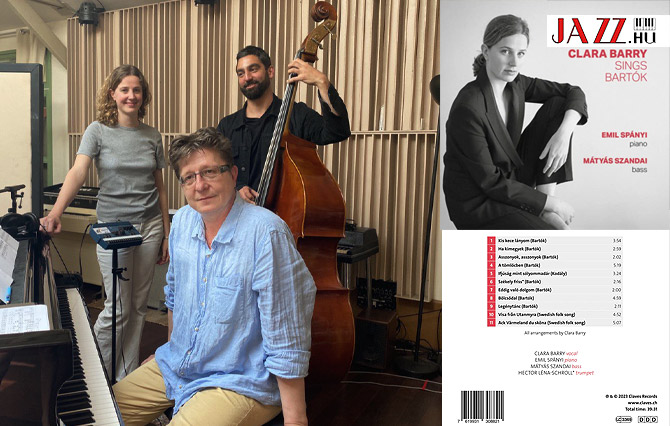
Clara Barry is a Swedish-American singer who creates and works in Switzerland and France. In Paris, he met first Emil Spányi and then Mátyás Szandai, which resulted in a beautiful album. On the 40-minute album, „Clara Barry Sings Bartók” - there are Bartók adaptations that she sings in Hungarian, except for two songs.
Ever since Bartók's works were freed for adaptations (2015), many Hungarian musicians have transformed his well- or lesser-known songs to their own musical idiom.
I asked Clara Barry how long she had known and loved Bartók's world, why she chose those two musicians, and why she felt it was important to sing the songs in Hungarian.
I really hope that soon we will be able to enjoy this unique music created from Bartók's collection in Hungary. So far, I have not received a response from Opus Jazz Club and Fonó to my inquiry, but we will let you know as soon as it arrives.
- Irk Réka/Jazz.hu: Please tell us a little about yourself so that the readers can get to know you.
- Clara Barry: I am a Swedish-American singer, composer, arranger, and violinist commuting between Paris (France) and Lausanne (Switzerland). I am currently studying for a Masters in pedagogy at the Haute Ecole de Musique in Lausanne. This is where I met Mátyás Szandai, who was also a student in pedagogy. I grew up studying classical violin, American jazz music, and Swedish folk songs passed down by my Swedish mother. Bartók believed that to create a new musical language and to break with the German domination in music, it was necessary to go back in time and learn the language "of the earth," the mother tongue, that of ancestral peasant songs. This process and his work touched me deeply. I believe that our times are going through a similar crisis of nationalism and a great desire for renewal and new musical expression. In any case, my many cultural and musical influences have led me to want to reappropriate this music in a jazz way, without betraying or breaking with Hungarian heritage.
- Irk Réka/Jazz.hu: When did you become interested in Bartók's (and Kodály's) music?
- Clara Barry: My Romanian classical violin teacher, who often claimed Bartók was Romanian, taught me the Román népi táncok , which is one of the very few if not the only Bartók piece studied in the classical conservatory in France. The pianists learn maybe a bit of Mikrokosmos I’m not sure. In any case, we all learn that Bartók was the first ethnomusicologue and was influenced by folkmusic to compose but sadly we never actually listen to the music, or learn it.
My father (an American!) was the one who introduced me to Bartóks vocal work, especially the Hungarian folksongs back in 2015, telling me it would suit me and that I should make a project out of it. The first song I listened to was „A tömlöcben” a version by Erika Sziklay and István Lantos. The beauty and the strangeness of it struck me immediately, I fell in love with it.
It took me several years to find the right musicians to play this music. I first gave it a try with a french classical pianist, but it didn’t work out. It was the same thing with some jazz musicians. I had to wait until I was preparing my Bachelor’s degree recital at the Haute Ecole de Musique de Lausanne (HEMU). The click came when I met Emil Spányi and Mátyás Szandai. They were so extraordinary, the result was even better than what I could have ever imagined. First of all, they are unbelievable players, jazz and classical, but also master Bartóks language so naturally.
The discovery of Kodály came along with my research on Bartóks work. It is impossible to separate their work, as they were so close when collecting the folksongs, travelling together and composing. What also passioned me greatly was the whole pedagogical aspect of it, that Bartók wanted to value the hungarian culture, its music transmission, to make little children learn their musical mother tongue. Matyi told me he learned music as a child with Kodály method, and that it was very common in Hungary.
I myself learned to sing as a child with swedish folksongs, I was so touched by the whole process, especially as the oral tradition and transmission is becoming so rare in the western world. I found it beautiful that in Hungary it is still very present thanks to Bartok’s and Kodaly’s work, I guess.
I've always thought that Bartók was a jazzman before his time: he improvised, spent his life interested in and collecting folk music from all over the world and rearranging it in his own way; that's really the jazz state of mind. The history of jazz has shown that the evolution of this style was nourished by perpetual quests for new inspiration, in the appropriation and arrangement of music from different cultures and horizons. There's something fascinating about this constant search for inspiration: it's the ability to appropriate new musical material while at the same time imprinting one's own personality on it. Bartók was fascinated by folk music and earlier traditions, so he wasn't ready to abandon tonality altogether. For these reasons, Bartók has influenced jazz musicians immensely: many have attempted to interpret and arrange Bartók's music .
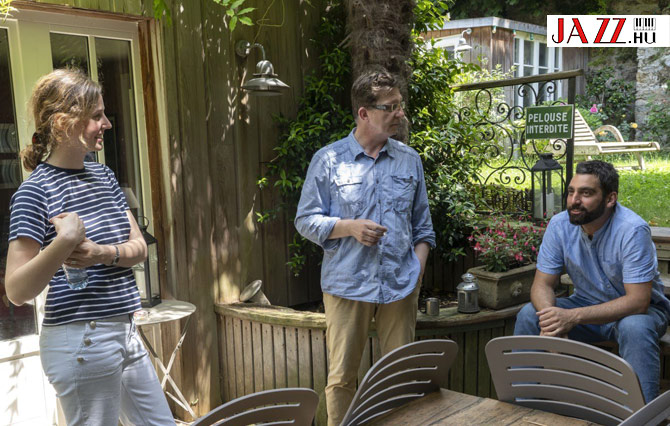
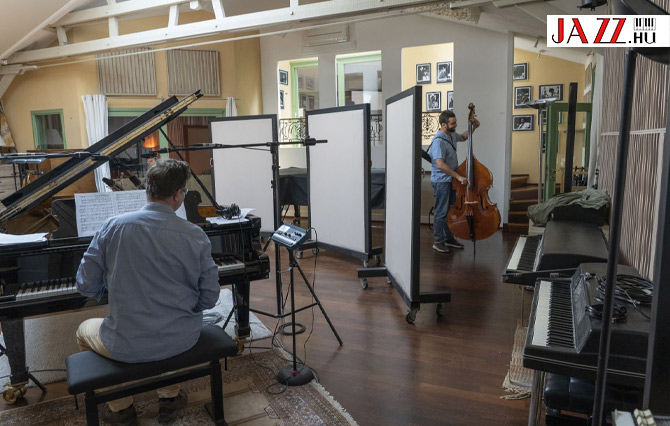
- Irk Réka/Jazz.hu: You sing in Hungarian on the album, Clara Barry sings Bartók. Thank You! How did you manage to learn the Hungarian language so well? Do you also speak Hungarian?
- Clara Barry: At first I was very arrogant, I thought „I am very talented with languages this doesn’t scare me”. Little did I know. When I started to get down to it I thought „I will never manage, this is impossible”. And that goes without the musical difficulty of Bartók. This is also when I realised why only hungarian singers sing in hungarian.
I met a hungarian violinist, Arthur Papp, who recorded the lyrics in an extremely slow tempo, so I could hear all the details and subtleness of this language that resembles no other. I had to train the muscles of my mouth to form the sounds that I had no familiarity with. At first, I would speak along the words with Arthurs recording, then the same process but with the melody. I would send my recordings to Arthur and he would correct.
I shared the story of my struggle with an American singer who answered „if you don’t manage to sing in Hungarian, just sing the translations”. I tried but it sounded weird and kind of ridiculous. Singing in Hungarian was a huge part of what gives this music such a strange and unique character. This work on pronunciation took over six months. Still, it was essential to do justice to Bartók’s works that comprise stories which are over a thousand years old in some cases.
The translation was hard, Emil helped me out with it ; with all the double meanings, the metaphors and the cultural references that I did not have. Also, it’s surprising that some words even Hungarians don’t understand. Kis Kece lányom for instance, apparently no one really knows what it means!
I do not speak Hungarian, although a lot of words come back in those songs so I understand some of it but apparently it’s very old Hungarian, so I guess I understand ancient Hungarian! I always joke when I meet a hungarian and say „Szia pajtás!”
- Irk Réka/Jazz.hu: In addition to the language, the rhythm could not have been easy for you either. Didn't it scare you? How did you manage to make it yours? Have you ever been to Hungary?
- Clara Barry: I read the text of Bartók’s conference in Harvard where he talks about musical patterns that are specific to Hungarian music.
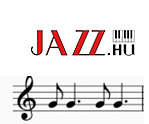 This rhythm particulary.
This rhythm particulary.
As Bartók says, the rhythm comes from the language, so the music already lies in it! I also did a lot of research on these songs, try to see if they were still played today and how did they sound compared to the Bartóks versions. I found some really interesting recordings, from Gypsies or some original recordings by peasants. So moving! It gave me an idea on interpretation and sound especially, the vocal techniques being very different, but I never wanted to imitate. First of all, because I think it’s less interesting but mostly because the whole purpose of Bartóks project was to renew the musical language, be creative while being inspired by the tradition. His work was very creative and original although rooted in folkloric culture. It’s exactly what moved me so I tried to interpret the music through my own musical perspective and language.
No I have never been to Hungary, although I reallly hope we can play this project soon! My only experience of Hungary is living for a week together with Emil and Mátyás to record the album. It was very funny because suddenly all the words I was singing made sense. I was laughing so much with „Székely Friss”, the song that talks about the devil going to take the old woman to hell if she doesn’t drink alcohol. Emil and Matyi would eat and drink so much. They would talk a lot in Hungarian and make jokes. Great memories.
- Irk Réka/Jazz.hu: When did you get the idea to make an album of Bartók's works? When did it even come out? There are older concert videos on YouTube, while the year 2023 is on the streams.
- Clara Barry: The idea of the recording came after our first concert, as it was a huge success. I then started to try to find a record label back in 2021. I contacted a lot of venues for concerts and labels, even the Hungarian institute in Paris without any success. Claves records in Switzerland published it in October 2023 after we had recorded it in June 2022 in Paris Studio Meudon. The process was very long as the music industry makes things very difficult for a young musician like me. The project is original, beautiful and is performed with one of the top musicians you could find so it’s hard for me to understand why I struggle with the promotion. I will never forget, as we had finished the recording, Matyi said how beautiful he thought this record was and that it will be hard to promote it as it is my first record, but he told me to be strong and keep fighting, because it is very precious and valuable music and worth it. So thank you so much Réka for your interest and beautiful questions, it means so much.
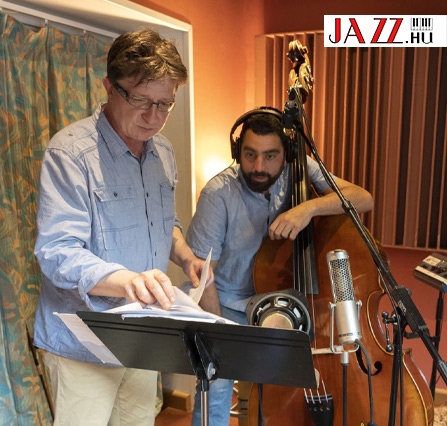
- Irk Réka/Jazz.hu: Where did you meet the other two members of the trio, Emil Spányi and Mátyás Szandai? How long have you worked together? How was working together?
- Clara Barry: I met Emil in Paris, he was my harmony teacher. Emil is a beautiful musician, sound engineer (he did the mastering of the album), and also a plane pilot! but also a genius pedagogue. He and Matyás are an incredible rhythm section, the dream for any soloist.
I met Mátyás in Lausanne, he was a pedagogical student at the HEMU.
I was very intimidated and shy to ask them to play in the project but they immediately accepted. We started working in 2021.
The group was very unique. We had a great symbiosis, I truly think it’s a once in a lifetime match. Emil and Matyi knew each other well, they were great friends and had played many years together. I think they were very moved that this random girl, super passionate about Bartók, singing in Hungarian, 25 years younger than them and goes on to create this group to perform and play Hungarian folksongs in the jazz idiom. After Matyi died, I was very moved to hear that he talked a lot about this project, and said it was one of the projects he was most proud of.
It was so simple to work together, it flowed so easily.
The recording was my first recording and what luxury to do it with them !. They were absolute beasts, nailed every take, were like big brothers to me, whenever I had doubts or struggled, they would be very cool and reassuring.
Mátyás was very impressive, very calm, could sight read absolutely anything, had a beautiful sound, great sense of rhythm and was very funny, he was such a unique player, how lucky I am to have played with him. He also was very humble and was always thirsty of learning. He said to me once, „I will manage to be great but only if I work very hard”. Maybe that’s what inspired me most with both of them. The huge discipline and hard working. No ego, just giving everything for the music.
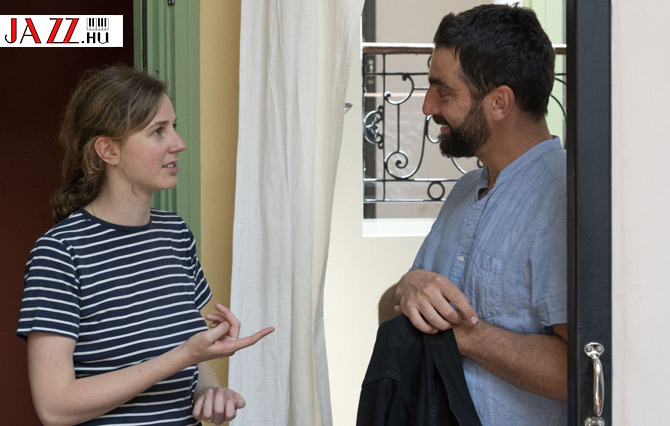
- Irk Réka/Jazz.hu: Why did you choose the 9 songs that appeared on the album? Is there more that you can sing?
- Clara Barry: I had listened to Bartóks complete vocal work. For weeks, I immersed myself into the music and wrote down the names of my favorite songs but also what was possible in musical way (arrangementwise and vocally). It is interesting to see that Bartók wrote songs for voice and piano but also arranged them for choir and used the same material in many different ways.
Yes there are more I can sing, we added more to the repertoire songs like „Már dobozon” „Komáromi kisleány”, and „Fekete főd”. I think we will expand the repertoire and arrangements over the years and concerts, it is of endless beauty!
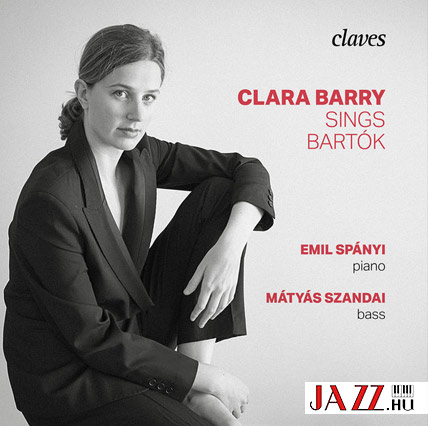
- Irk Réka/Jazz.hu: With the death of Mátyás, a process was interrupted, you can no longer a record debute in Hungary. What's next? Are you planning a concert or memorial concert in Budapest? I think it is difficult to replace Matyi, but it would still be good if the audience could also hear your Bartók arrangements. I know you’ve had a gig in France.
- Clara Barry: Yes it is so tragic, we had just had started this beautiful adventure. We would love to perform the project in Hungary. We were in contact with Opus Jazz Club to book us but no concrete plans for now.
We played last week in Sunset-Sunside in Paris with an italian drummer Marco Luparia. We will also play at Puplinge Festival in Geneva, and Zermatt festival
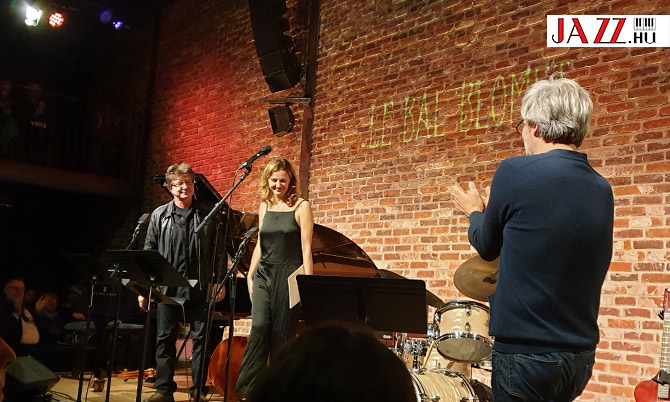
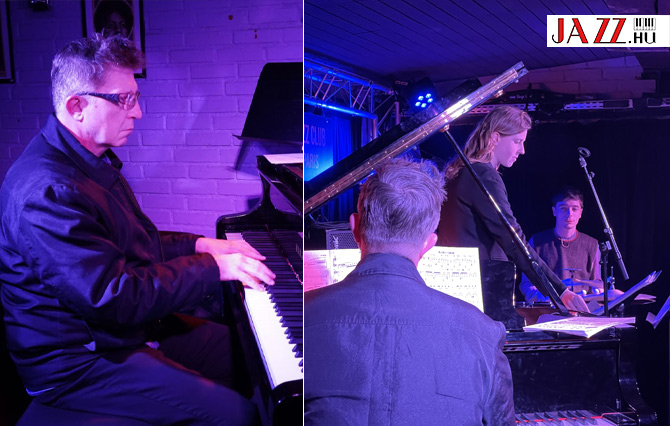
- Irk Réka/Jazz.hu: What are you currently working on? Will there be a Hungarian connection again at some point? The oeuvre of Bartók and Kodály is enormous. ?
- Clara Barry: Other then this Hungarian project, I am composing and performing with a harpist and also work with a jazz quartet that has a French Gipsy guitar player.
I would love to collaborate with Hungarian musicians on new projects!
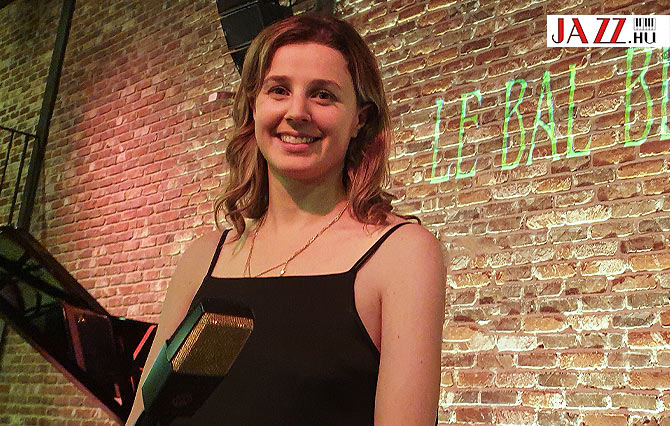
Fotó: Clara Barry




